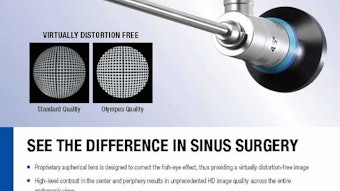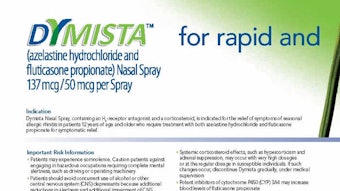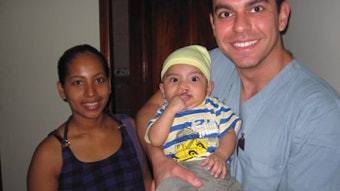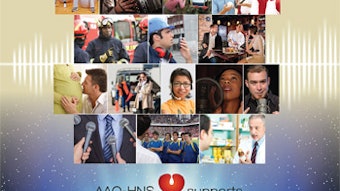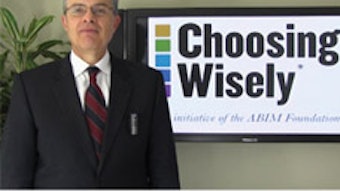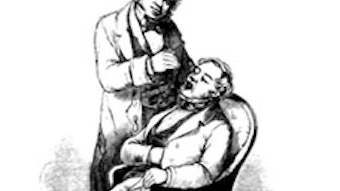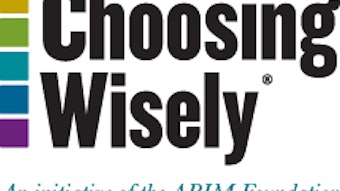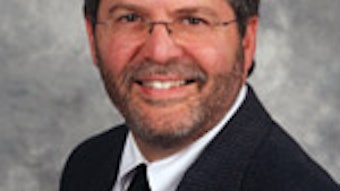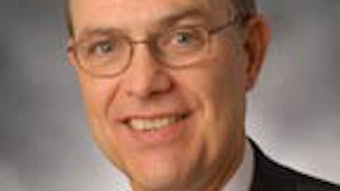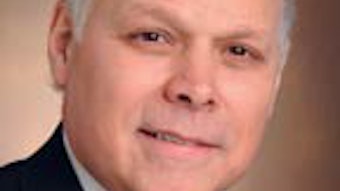Why You, Dr. OTO-HNS, Should Go to Washington in May
Kristina E. Hart, MD Women in Otolaryngology Section Historian For years, like many of you, I’ve been reading about the past JSAC meetings, the BOG Spring Meeting, and more recently, the combined BOG Spring Meeting & OTO Advocacy Summit. One only has to open the monthly Bulletin or read ones email to see that our Academy staff and an equally dedicated contingent of our membership are diligently working on our behalf to ensure that our specialty remains at the forefront of continuing education, innovation, policymaking, and reimbursement, and that our collective healthcare concerns as otolaryngologists-head and neck surgeons are being heard. So, why attend this meeting? The informative, yet necessarily abbreviated, “sound bites” in our news media and our Academy’s publications have long inspired me to gain a better understanding of the politics that affect how we practice medicine. The idea of being an advocate for our specialty did seem daunting, but curiosity and a desire to participate overcame intimidation and distance. I am so glad that I finally attended the 2012 BOG Spring Meeting & OTO Advocacy Summit, and I intend to make the trip again. As with many things, being there was far more interesting than reading about it. It was highly energizing to be surrounded by fervent and knowledgeable AAO-HNS members including residents, who form the nucleus of the Academy’s grassroots efforts. They, together with a broad network of ENT PAC supporters, put their money where their mouths are and work to change what we all find unacceptable for our practices and our patients. Our elected lawmakers could learn something about working together by watching our Academy members rally around common objectives regardless of personal political affiliation. My initial concerns about preparedness for meetings with Congressional staffers quickly evaporated thanks to the well-organized advocacy preparation provided by our talented Government Affairs (GA) team. By reviewing and discussing our issue-specific talking points, we were quickly prepared to present a unified voice on Capitol Hill. Truly, who better than we—the constituents in the trenches—to advocate for our specialty? You’ve heard terms like “individual mandate” and “severability,” but do you really know what these mean? What does insurance have to do with the Commerce Clause of our Constitution? What does the 10th amendment have to do with healthcare reform? The answers to these questions were among many illuminating and relevant facts that were expounded upon during this meeting. We also learned about the Capitol Hill version of “TIA” among many other acronyms and definitions. “Truth in Advertising” or the “Healthcare Truth and Transparency Act,” is legislation designed to help distinguish medical doctors from those who have doctorates in other health-related fields. One of the primary talking points was the repeal of the Sustainable Growth Rate (SGR) formula. What does the SGR have to do with our practices and us? Though illogical, more than a decade ago, the SGR was tied to the Gross Domestic Product and incorporated in a formula to calculate physician payment for Medicare services. This formula fails to accurately estimate the actual present day cost of practicing medicine. It must be repealed and replaced with a more appropriate barometer of the “real time” cost of providing healthcare.Why should we care what issues lurk behind the acronyms of today’s healthcare realities? Because, as students, we’ve invested many years continually training in our profession to do what is best for our patients. We have an instinct for self-preservation; no one else is likely to be as interested in, or as informed about, developing policies favorable to our patients and our profession as we are. We work hard to be effective communicators and to support effective communication among our patients through prevention and treatment of hearing and phonatory disorders. We’re also educators. A staffer’s questions regarding her niece’s tympanostomy tubes during discussion of the Congressional Hearing Health Caucus afforded me both a teaching moment and a perfect segue to inviting this senator’s team to seek me as a subject-matter expert on other specialty-specific topics. Our nation’s leaders can only represent us effectively if we communicate with them on a regular basis. We are citizens. In addition to having a responsibility to vote, we cannot complain about unfavorable outcomes if we are not part of the team that ensures implementation of sound policies. Freedom is not free. People from many nations are losing their lives for an opportunity to speak freely and choose their leadership. We are fortunate to already have a system in place that makes advocacy without fear of retribution possible. Our efficient GA team works hard to identify issues that may or will impact the work we do every day. While we each have the freedom to independently meet with our legislators, attendance at the Spring BOG Meeting & OTO Advocacy Summit creates myriad opportunities to a.) collaborate with colleagues; b.) hear from passionate, knowledgeable “insiders;” c.) participate in lively conversations with the Board of Governors on issues that directly affect our specialty; and stand united with our colleagues on Capitol Hill. I’ve barely scratched the surface of understanding all the intricacies of these policies and proposals, but I left Washington DC, more motivated than ever to continue my political education and advocate for our specialty. The meeting reaffirmed my conviction that as imperfect as our nation’s political system is, our forefathers had an ingenious idea. We ought to take advantage of it. Please attend this year’s meeting, Sunday, May 5 through Tuesday, May 7.
Kristina E. Hart, MD
Women in Otolaryngology Section Historian
For years, like many of you, I’ve been reading about the past JSAC meetings, the BOG Spring Meeting, and more recently, the combined BOG Spring Meeting & OTO Advocacy Summit. One only has to open the monthly Bulletin or read ones email to see that our Academy staff and an equally dedicated contingent of our membership are diligently working on our behalf to ensure that our specialty remains at the forefront of continuing education, innovation, policymaking, and reimbursement, and that our collective healthcare concerns as otolaryngologists-head and neck surgeons are being heard. So, why attend this meeting?
The informative, yet necessarily abbreviated, “sound bites” in our news media and our Academy’s publications have long inspired me to gain a better understanding of the politics that affect how we practice medicine. The idea of being an advocate for our specialty did seem daunting, but curiosity and a desire to participate overcame intimidation and distance. I am so glad that I finally attended the 2012 BOG Spring Meeting & OTO Advocacy Summit, and I intend to make the trip again.
As with many things, being there was far more interesting than reading about it. It was highly energizing to be surrounded by fervent and knowledgeable AAO-HNS members including residents, who form the nucleus of the Academy’s grassroots efforts. They, together with a broad network of ENT PAC supporters, put their money where their mouths are and work to change what we all find unacceptable for our practices and our patients. Our elected lawmakers could learn something about working together by watching our Academy members rally around common objectives regardless of personal political affiliation.
My initial concerns about preparedness for meetings with Congressional staffers quickly evaporated thanks to the well-organized advocacy preparation provided by our talented Government Affairs (GA) team. By reviewing and discussing our issue-specific talking points, we were quickly prepared to present a unified voice on Capitol Hill. Truly, who better than we—the constituents in the trenches—to advocate for our specialty?
You’ve heard terms like “individual mandate” and “severability,” but do you really know what these mean? What does insurance have to do with the Commerce Clause of our Constitution? What does the 10th amendment have to do with healthcare reform? The answers to these questions were among many illuminating and relevant facts that were expounded upon during this meeting. We also learned about the Capitol Hill version of “TIA” among many other acronyms and definitions. “Truth in Advertising” or the “Healthcare Truth and Transparency Act,” is legislation designed to help distinguish medical doctors from those who have doctorates in other health-related fields.
One of the primary talking points was the repeal of the Sustainable Growth Rate (SGR) formula. What does the SGR have to do with our practices and us? Though illogical, more than a decade ago, the SGR was tied to the Gross Domestic Product and incorporated in a formula to calculate physician payment for Medicare services. This formula fails to accurately estimate the actual present day cost of practicing medicine. It must be repealed and replaced with a more appropriate barometer of the “real time” cost of providing healthcare.Why should we care what issues lurk behind the acronyms of today’s healthcare realities? Because, as students, we’ve invested many years continually training in our profession to do what is best for our patients. We have an instinct for self-preservation; no one else is likely to be as interested in, or as informed about, developing policies favorable to our patients and our profession as we are. We work hard to be effective communicators and to support effective communication among our patients through prevention and treatment of hearing and phonatory disorders.
We’re also educators. A staffer’s questions regarding her niece’s tympanostomy tubes during discussion of the Congressional Hearing Health Caucus afforded me both a teaching moment and a perfect segue to inviting this senator’s team to seek me as a subject-matter expert on other specialty-specific topics. Our nation’s leaders can only represent us effectively if we communicate with them on a regular basis.
We are citizens. In addition to having a responsibility to vote, we cannot complain about unfavorable outcomes if we are not part of the team that ensures implementation of sound policies. Freedom is not free. People from many nations are losing their lives for an opportunity to speak freely and choose their leadership. We are fortunate to already have a system in place that makes advocacy without fear of retribution possible.
Our efficient GA team works hard to identify issues that may or will impact the work we do every day. While we each have the freedom to independently meet with our legislators, attendance at the Spring BOG Meeting & OTO Advocacy Summit creates myriad opportunities to a.) collaborate with colleagues; b.) hear from passionate, knowledgeable “insiders;” c.) participate in lively conversations with the Board of Governors on issues that directly affect our specialty; and stand united with our colleagues on Capitol Hill.
I’ve barely scratched the surface of understanding all the intricacies of these policies and proposals, but I left Washington DC, more motivated than ever to continue my political education and advocate for our specialty. The meeting reaffirmed my conviction that as imperfect as our nation’s political system is, our forefathers had an ingenious idea. We ought to take advantage of it. Please attend this year’s meeting, Sunday, May 5 through Tuesday, May 7.
